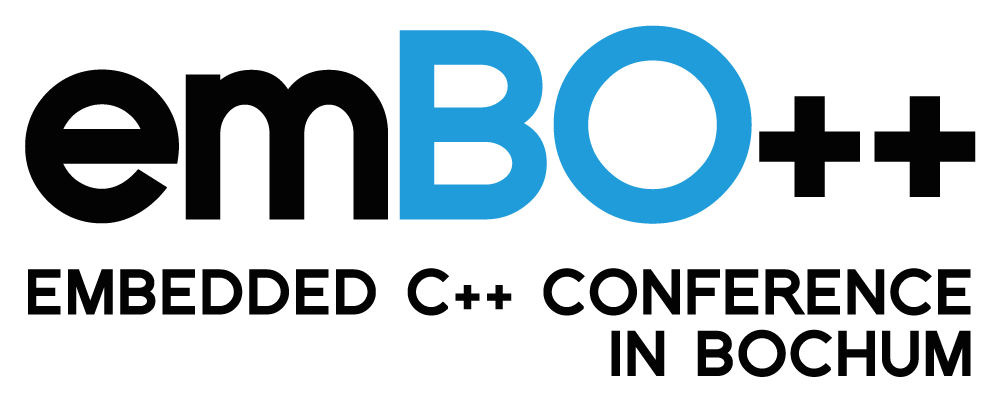OUR SPEAKERS 2025
Stephan Bökelmann

Graph Based Curricula
Programming curricula are usually organized linearly, with a fixed start and end, gathering a set of experiences along the way. Despite calls for more individualized learning, this has remained the norm.
An individual's traits and skills can be modeled as a multidimensional vector, where learning is a translation through skill space. Optimizing this process has parallels to the brachistochrone problem in physics.
General-purpose transformers (GPTs) are powerful for text generation but lack precision for structured educational outcomes. Based on my experience teaching programming in Bochum, I have developed a refined learning system, now in an experimental phase.
This talk explores my curriculum’s modeling, implementation, and workflows. It is especially relevant for professionals in embedded development, offering insights into algorithm-driven teaching methods.
From Code to the Outback: Embedded Systems in Solar Racing (working title)
The Sonnenwagen Aachen team is a student organization dedicated to designing and building solar-powered race cars to compete in the World Solar Challenge — a grueling 3,000 km race across Australia, powered solely by the sun. The vehicles competing in this challenge are among the most energy-efficient in the world.
In this talk, Lennart Kling and Julian Falk will introduce their project and team structure before diving deep into the onboard computer — the brain of the vehicle. As part of the electrical engineering team, they developed a real-time operating system (RTOS) to optimize power consumption and enhance vehicle efficiency.
They will share insights into how their embedded system is structured, what challenges they faced, and how they implemented power-saving techniques through smart software design. Expect a mix of high-level project insights and deep technical details straight from the Sonnenwagen development process!
Julian Falk and Lennart Kling

Stefan Fuhrmann

Balancing Coding Rules with Embedded Systems Constraints
Most organizations and projects establish coding rules or guidelines to help developers write clean, safe, readable, and maintainable code. However, these rules sometimes conflict with the need for performance efficiency and memory usage – especially when dealing with specific hardware and compilers. Since these attributes are critical to the success of embedded projects, we need to adapt certain rules to strike the right balance. In this talk, we will share our experiences and insights on this topic, focusing specifically on the challenges in embedded software development. This will give you guidance on what pitfalls to look out for and how to address them.
Data Mining Hardware Descriptions from Code, Tools, and Docs
There are a lot of slightly different microcontrollers out there. So many, that it is difficult to answer simple questions about what features they support, especially in detail. In this talk we'll look at what data sources exist for STM32 devices and how easily they are to access and how accurately they are compared to each other. May contain actual data science!
Niklas Hauser

Max Hoffmann

Security Beyond Memory Safety - Using Modern C++ to Avoid Vulnerabilities by Design
Nowadays, there is one topic that comes up in virtually all discussions on system programming languages: memory safety.
However, even though memory safety rules out many of the most common sources of vulnerabilities, there are still plenty of ways how a vulnerability may find its way into the codebase. In this talk, we look beyond memory safety and explore how we can prevent vulnerabilities through simple yet effective C++ constructions.
To this end, we discuss security engineering, attacker models, threats, and implementation pitfalls, before looking at solutions that are not just secure by themselves but also protect developers from accidentally introducing vulnerabilities in the future.
Together, we iteratively apply these solutions to an elaborate example inspired by real-world products, use cases, and vulnerabilities, to end up with a sustainably secure software.
Attendees will leave with a deeper understanding of security engineering and with inspirations for leveraging C++ to prevent potential security issues by design.
Experiences with codebases of three C++ Quantum Libraries: Quantum++ (qpp), Staq, and Qulacs
This talk presents experiences on working with the codebases of three C++ quantum libraries: Quantum++ (qpp), Staq, and Qulacs. Specifically, the talk will compare coding paradigms, performance trade-offs, and compatibility considerations. Key takeaways include coding guidelines for leveraging C++ in quantum software development and lessons learnt for selecting the most suitable library based on specific requirements.
Babar Khan

Frank Landgraf

In 2020, he co-founded a cooperative of IT professionals: https://wtf-eg.de.
Collecting time-synchronized measurements - the LabstreamLayer ecosystem
The talk will give a short overview of the labstreamlayer library and the xdf fileformat and how I used it to combine different measurements for neuromotorical experiments. It will show some open source tools for storing and visualizing data from these measurements and will give some coding samples how to sample data in C++ and python, the same for reading sample data from a stream.
Specifiers, qualifiers and the long road to const
In C++98, we already had const, volatile, static, extern and inline. In C++11, thread_local and constexpr were added. In C++17, inline variables were introduced. In C++20, we've got consteval and constinit. But have you ever wondered what a static inline thread_local constexpr const volatile variable is? In this talk, Mikhail will attempt to break down all this variety of keywords. We'll recall linkage and storage duration. We'll understand the connection between static and constexpr, between extern and inline. And we'll realize why it took us almost 20 years to learn how to properly declare constants.
Mikhail Matrosov

Filipe Mulonde

Behind the Scenes of OpenGL: From Object Space to Screen – Transformations, Projection, Clipping, and Depth Testing
How does OpenGL transform 3D objects into a final 2D image on your screen? This talk explores the full journey from object space to screen space, covering key transformations, projection, clipping, culling, and depth testing. We’ll break down how OpenGL processes geometry, applies perspective, and optimizes rendering for efficiency. By the end, you’ll have a solid understanding of how objects are projected, transformed, and displayed.
The Evolution of Hammer
Software development is not only about writing code, it’s also selection of tools, processes and infrastructure. Some of them is visible in day-to-day work, some hidden in background. All of it affects quality and comfort of our work. This talk is a case study on how we (Flight Software team in KP Labs) evolved out infrastructure and tools for (mostly) embedded development over 6 years.
Maciej Nowak

Tabea Röthemeyer

git with features
In Git, we typically bundle code changes with a commit message explaining the 'what' and 'why.' These messages often provide important context, allowing others to understand the specific purpose of the changes. However, commits themselves often relate to broader contexts—such as issues, features, or bugs—that aren't always explicitly captured in the commit message itself. This leads to situations where key information may be difficult to find or piece together. In this talk, we’ll explore how we can better leverage Git to not only track code changes but also add richer contextual information about the changes being made. By incorporating relevant references to issues, tasks, or other project artifacts, we can create a more comprehensive and accessible history. We'll also explore how new tools or Git workflows can help us access and query this context information more effectively, ultimately improving collaboration, tracking, and the overall understanding of the codebase’s evolution.
Cross-Layer Approximations for Enabling Energy-Efficient Edge Computing
Approximate Computing (AxC) has emerged as a powerful technique for enhancing the efficiency of AI and machine learning (ML) workloads on resource-constrained edge devices. By intentionally introducing controlled inaccuracies in computations, AxC takes advantage of the inherent resilience of AI/ML models, leading to significant improvements in power, performance, and area (PPA). AxC can be applied across various layers of the computing stack, but approximate arithmetic operators have a particularly direct impact on the PPA costs associated with arithmetic operations during AI inference. Therefore, researchers are actively exploring approximate arithmetic operators that offer substantial PPA benefits while capitalizing on the error tolerance of AI models. In this presentation, we will introduce the topic and highlight the importance of the cross-layer approximation framework. We will emphasize the need for a generic and scalable approach to designing approximate arithmetic operators. Additionally, the presentation will discuss the crucial role of considering the architectural specifics of the underlying platform when developing approximation techniques, particularly those suited for FPGA-based approximate computing.
Salim Ullah

Detlef Vollmann

Hardware-in-the-Loop testing using low-cost hardware and C++OS
Hardware-in-the-loop (HIL) testing is an important step in the development of embedded systems. Most interaction in embedded systems are based on digital protocols like I2C, U(S)ART, SPI or even simple high/low GPIOs. For testing the correct handling of such interfaces the external counterpart can easily be provided by low-cost boards running C++OS. This presentation shows how you can use C++OS on a such a low-cost board to run HIL tests on your embedded system.
Don't Use C OS Interfaces From C++
HIf your embedded OS provides a C API to start a thread, it's probably ok to use it from a C++ program. But if your embedded OS provides a concurrent queue with a C API, and you use it from C++, you're hosed.
This talk tells you why.
Detlef Vollmann



